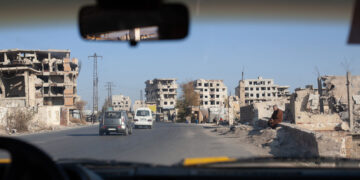Mike Eisner is the General Counsel and Chief Operating Officer of DAWN.
Published in CNN, July 13, 2021
Saudi Crown Prince Mohammed bin Salman is planning a $500 billion model city in the desert of northwest Saudi Arabia. Built from scratch, NEOM will purportedly be powered by clean energy, run by artificial intelligence, enhanced by machine learning, serviced by robot maids and flying taxis, and illuminated every night by a giant artificial moon.
History suggests, though, that the tens of thousands of migrant workers who build NEOM will experience few of the upsides of the promised future city or escape the exploitation endured by millions of other migrant workers already toiling in Saudi Arabia. If the large multinational businesses contracted to develop NEOM want to avoid complicity in Saudi's systemic exploitation of migrant workers, they will have to put in place policies and practices that effectively safeguard their workers' rights.
As advertised in a slick interactive website, NEOM represents a fantastic vision, a booming metropolis without cars or streets or carbon emissions, and with the feel of a small community in which all essential daily services, such as schools, parks and offices, are within a five-minute walk of all residents. By 2030, the City will become, according to Saudi planners, home to one million people from all over the world in a land area nearly 34 times the size of New York City.
Saudi Arabia and other Gulf countries have a grim record when it comes to the treatment of migrant workers who have built their cities. These workers, most of whom hail from South Asia, often borrow to pay large recruiter fees and find themselves before their first day of work in debt, which they spend the first few years of their employment simply paying off. Under the exploitative sponsorship system known as kafala, migrant workers often have their passports confiscated by employers who subsequently exercise veto power over their workers' decisions to change jobs or even leave the country. Working conditions for construction workers are often particularly brutal, with long work hours on dangerous work sites in boiling hot temperatures.
In the face of international pressure to stem abuses against migrant workers, the Saudi government has periodically introduced labor reforms, most recently in March 2021. According to a statement by the Ministry of Human Resources and Social Development, the initiative was intended to "enhance the contractual relationship between workers and employers" and establish an "attractive" job market that would put it "on par with similar international markets."
But the reforms have always been severely limited, leaving out large segments of the migrant worker population, and not addressing key conditions that have enabled worker abuses, such as the ban on collective bargaining.
More importantly, Saudi Arabia has failed to rigorously enforce its reforms. Indeed, despite previous labor reforms intended to prohibit unpaid wages, confiscation of passports and dangerous working conditions, such abuses remain rampant amongst migrant workers, too many of whom find themselves trapped in debt and unable to leave the country, living in conditions that amount to modern slavery.
Equidem has found that the Covid pandemic has only worsened the situation, magnifying the dangers of close-quartered living conditions and leading many companies to fire workers abruptly or stop paying workers who continue on the job.
NEOM's workers might be even more vulnerable than their counterparts in the rest of Saudi. The model city is the brainchild of the Saudi Crown Prince Mohammed bin Salman, who unveiled plans for the new city with a dazzling promotional video at the "Davos in the Desert" conference in Riyadh in October 2017, and who, according to a report in the Wall Street Journal, is said to have referred to NEOM as his "pyramids."
The impulsive, sometimes brutal Crown Prince will likely not respond well if and when his pet project — part of his plan to reshape Saudi Arabia's economy — runs behind schedule. Indeed, construction began in January 2019, but has since been bogged down in delays, and the two different announced completion dates for the city — 2025 and 2030 — both seem increasingly farfetched.
The Crown Prince's government has already demonstrated a violent approach to eliminating obstacles to NEOM's development, conducting a harsh and sometimes deadly campaign of forcible displacement of the native Huwaitat tribe from their ancestral lands located in a stretch of desert inside the larger area designated for the model city.
To truly become a model city for the future, NEOM must start right here in the present with a commitment by relevant stakeholders to responsible business practices and sustainable development. Multinational companies, such as US engineering, construction, gas and chemical companies Bechtel, AECOM, and Air Products and Chemicals, and UK-based Solar Water that have already signed billions of dollars worth of contracts for development in NEOM as well as the companies that will follow, should adopt written policies and practices for the protection of workers they employ or subcontract in line with accepted international human rights instruments, standards and guidelines.
These include a commitment to taking appropriate measures to stop the charging of recruitment fees to workers, adopting a minimum wage; and ensuring workers have the right to change jobs, the right to control their passports and leave the country, and the ability to engage in collective bargaining. They must also commit to establishing safe and sanitary living and work conditions, including extra measures that might be required to protect workers against Covid, and a ban on work in extreme heat conditions.
As they break ground on their spectacular projects, global companies are set to profit handsomely in NEOM, but they must not do so at the expense of their workers. Businesses involved in developing the futuristic city must help end the abuse and exploitation that are too often part and parcel of the migrant worker experience in the region. Envisioned as a model and sustainable city, NEOM will be neither unless it is undergirded by sustainable labor and respect for workers' rights.
![]()






































